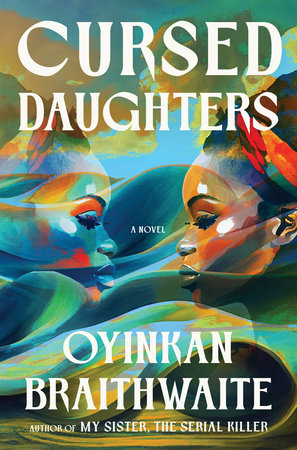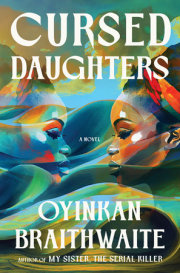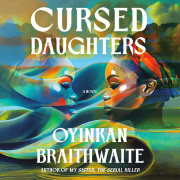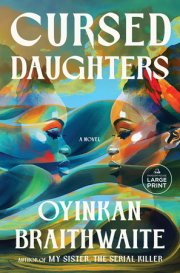PART I
Ebun (2000)
I
“Gone too soon,” the pastor had said, and she thought it the understatement of the century. Gone too fucking soon.
The weather was all wrong. It was rainy season; at least it was supposed to be. She would have welcomed dark clouds, thunder, a perfect storm. Instead, the sun was relentlessly bright and the sky was crystal clear. She fanned herself with her hand; it did nothing to relieve her discomfort. Off in the distance, she could hear the beat of a gángan, the trumpets and the joyous chorus that accompanied it—the soundtrack was all wrong, too.
Someone grabbed her hand and a small moraine of soil was poured on to Ebun’s palm. She stared at it, momentarily forgetting what she was supposed to do . . . oh yes—sprinkle it on the pine prison that housed the body of her cousin. She released soil over the coffin and watched it scatter. Beside her, her mother wailed.
It was done. It was done. And Tolu was already walking away. She watched him step on grave and grass as if there were no difference between them. He had barely spoken to her mother and herself, and when he did, it was “yes,” “no,” “okay.” Her mother had ascribed the behaviour to grief, but Ebun knew it was condemnation.
The drums were getting louder, the singing more frenzied. She was starting to believe the
gbin gbin gbe of the gángan was taking place within the walls of her skull, but then a gathering of people paraded by, led by musicians. They were straight-backed, dressed in Ankara aso ebi, chatting, some even laughing and skipping over graves as they exited Ikoyi Cemetery; oblivious to the wretchedness a stone’s throw from them. Whoever it was the jubilating group had buried had likely reached their twilight years, probably had children and grandchildren and possibly died in their sleep. Not so Monife. She was, is . . . was only twenty-five.
Ebun looked around and saw Mo’s mourners were beginning to melt away. They mumbled goodbye to one another; some exchanged hugs. Mo’s father was soaking in the sympathy and accepting condolences as if they were his due. She stayed out of his way, lest she speak her mind. Tolu had had a similar idea—throughout his sister’s funeral, he’d stayed ten feet away from his father at all times.
She was tired and her feet hurt, so she left the cemetery as quickly as her distended belly would allow. When she got to the car, she realised the keys were with her mother. She was forced to wait under a sun that was dry-eyed and unfeeling, the sweat running down her forehead, into her eyes, down her neck and her chest. She wiped it with her hand, but it kept on coming. Her discomfort must have been shared by the baby, because the kicks came hard and fast. She was worried she would faint, so she carefully sat on the ground, under the shade of a palm tree.
How quickly life changed. The note, searching for Mo, receiving word that a body had been found, burying her . . . it had all transpired in the course of ten days; but it had felt like a millennium. She waited for the tears to come, as she had done since she got the news of Mo’s death, if only to relieve her of the lump in her throat and chest; but there truly was no peace for the wicked.
“Ebun. Ebun.” She looked up. Her mother was standing over her, eyes raw from crying. “Are you okay?”
What a question. She struggled to rise from the ground, so her mother helped her up. They got into the Beetle. She hoped they would drive in silence, but her mother wanted to talk.
“It was a nice service, wasn’t it?”
“Mmm.”
“I think Monife would have felt loved.”
Love was what had gotten Monife buried six feet under. But Ebun chose to keep her true thoughts to herself.
“Yes, she would have,” she replied.
II
Her mother dropped the car keys into a glass bowl on the console table in the hallway, among the kobo coins, lint and someone’s bangles. The keys clinked against the glass and the ensuing echo tricked her into thinking that the house was empty. But alas, she soon made out the gentle murmuring of women talking quietly, as if intent on not waking any ghosts.
She could guess why they were here—Aunty Bunmi hadn’t attended the funeral because it was considered taboo for a mother to bury her child; and since it would have been unwise to leave a grieving mother alone, a few family members must stay with her. Ebun understood all that, but she couldn’t bear the thought of seeing any more people, so she began to head for the stairs. “Ebun,” her mother said. “You have to go and greet your aunt.”
She was about to make an excuse, when she noticed something was off. On the wall to the right of the console she was looking at five framed photographs, where there used to be eight. The missing photos had all featured Mo—Mo holding her university certificate, Mo beaming at the camera with the shadow of the beach in the background, Mo with one arm around Ebun’s shoulders and the other around Tolu, pulling them tightly to her.
She took a couple of steps back and scanned the wall on the left side of the console table. It was missing the picture of Mo, Tolu and their mother awkwardly posed, and the picture with Mo in her role as bridesmaid.
“What’s happened to Mo’s pictures?” she asked, as calmly as she could.
Her mother looked up at the wall and sighed, scratching her forehead with a long nail.
“I . . . If this is what your aunt needs, maybe it’s for the best . . .”
Ebun could tell her mother had not been a part of the picture-removing committee, but Kemi’s words only fuelled her anger.
“Ebun, where are you going?”
Ebun hurried through the dismal corridor to the east wing. The way was narrow and dim, not unlike walking through a tunnel. A little creativity—lowering the walls around the courtyard that divided the Falodun home into two wings, or adding windows—would have made the house a little less claustrophobic; but then again, the iroko tree at the centre of the courtyard would probably have blocked out all possibility of natural light. She opened the east living room door to meet a collection of photographs so large that they rose almost to the ceiling, with the oldest of them devoid of colour. Some dated back all the way to the matriarch—Feranmi Falodun. She searched for her cousin, but here too all trace of Monife was gone. Ebun felt a buzzing in her head. It was bad enough that Aunty Bunmi had not been there to lay her daughter to rest, but now they were pretending Mo had never existed in the first place.
She wanted to scream. She did not know what had possessed her aunt, nor did she care. She would march up to her and demand that—
“Ebun.” Her mother was in the doorway, blocking her exit. “Ebun. Today is not the day.”
Kemi was small, only five foot—the height of a child. And considering the fact that she was always on some diet, she was probably the weight of a child. It wouldn’t be hard to shove her out of the way.
“Mummy, please. Move.”
“Ebun.”
“I just want to talk to her.” A part of her was fizzing at the thought of being angry at someone other than herself, being able, just for a moment, to release the tightness in her chest.
“Please,” her mother said, but Ebun pushed past her and headed for the west wing. She took the shortcut, through the courtyard, past Sango. He was camouflaged by the shadows; all but the creepy eyes that followed her. She ignored him and entered the west wing corridor. Behind her, she could hear the hurried steps of her mother’s heels against the terrazzo floors.
“Ebun. Ní sùúrù.”
She ignored her mother’s appeal for calm.
“Aunty Bunmi!” she shouted as she approached the west living room. “Aunty Bunmi!”
The door opened as she reached it, and Aunty Bunmi stood in its frame. She was dressed in a plain skirt and blouse, not unlike her headmistress garb. Her eyes were swollen and her lips trembled. She was flanked by Grand-Aunty Sayo, Grand-Aunty Ronke, Mama G and Mama G’s obscenely large breasts. Of course Mama G would be there, whispering fictions into Aunty Bunmi’s ear. Ebun dragged her eyes from the mamalawo, choosing to focus her attention on Mo’s mother. She should have curtsied for the older women before her, and she hoped they noticed she had not observed the custom.
“Where are her pictures?” Her voice was low, slow and deep.
“Ebun,” her mother pleaded, “this is not the time.”
“Where are they?” she asked again.
The corridor was narrow; Ebun was blocking the only real exit out of the west living room. The four women were essentially trapped and withering under her gaze.
Aunty Bunmi lowered her eyes. She would not give Ebun the fight she needed.
“It is best this way,” began Mama G. “Or her spirit might linger.”
So it was Mama G’s idea? She could kill her. She had no idea why her aunt thought it appropriate to have a mamalawo here at this time, but if the woman could not hold her peace, Ebun would happily bury her on the family grounds. At the very least, she would make her regret meddling in their business. And then she would find Mo’s pictures.
Ebun took three steps, aiming to close the gap between herself and the women before her, when she felt a gushing release from between her legs. She looked down at the puddle of water, bright against the floor. “Shit,” she said, and then burst into tears.
“Ebun, ṣé kò sí?”
“I . . .” But she couldn’t get the words out. She tried to breathe but couldn’t stop crying. If she could have gathered the water pooling at her feet and shoved it back up into her vagina, she would have done; because it was early yet, her baby wasn’t due for another five weeks. But her grief and her fury must have stirred the water in her womb, and now the baby was pressing against the wall that was meant to keep her safe. It was too early.
She would lose her child; and on the day she had buried her cousin. Call it fate. Call it karma. She squeezed her eyes shut. She couldn’t follow that train of thought. Her mother was shouting.
“What?! What?! What is it? What has happened?” asked Grand-Aunty Sayo. They were still far enough away that they hadn’t seen. Ebun placed a palm on the wall and tried to calm herself.
“She has wet herself,” her mother confidently informed them. Ebun tried to regulate her breathing. Her baby would be okay. She had to be.
“She can’t have wet herself, Kemi.”
“Are you not seeing what I am seeing?”
“It is her water. Her water has broken.”
Aunty Bunmi’s words were firm. She touched Ebun’s arm with a cool hand, steadying her, then she pulled her into the living room, leading her to an armchair. Five sets of eyes peered at her.
“It can’t be her water. It’s not time yet!” her mother shouted. No, it wasn’t time yet. Perhaps Ebun was about to learn what it felt like to lose a child.
Her aunt’s sombre eyes met her own for a brief moment. Then they both looked away. Ebun thought about the anger she had felt mere moments ago. What had she really thought she could say to the woman? All she felt now was a wave of tiredness. She spotted Sango’s dark shape disappear behind the couch.
The women were debating what to do. Grand-Aunty Ronke suggested she should lie down, close her legs and the baby would relax. Her mother was pacing back and forth, speaking in tongues, and Ebun instinctively looked around to locate one of her cousins so they could share an eye-roll; and then she remembered—Mo was gone and Tolu wanted nothing to do with her.
“Maybe Mama G can . . .” began Aunty Bunmi.
Ebun shook herself. She had no intention of giving herself over to a mamalawo and the spirits she entertained. This was her child and she would fight for her soul.
“Just get me to a hospital.”
III
They told her to push. Push.
As if it was easy; as if they weren’t asking her to surrender herself to death.
She heard someone give a guttural cry, and then realised that she was the someone. She had been right to fear this pain. She didn’t think she would survive the experience. A voice told her she was doing well, but it was as though she were submerged underwater and the voice was trying to reach her from the surface. The words had no meaning. She breathed. She pushed. She felt the head crowning. She screamed, and it was over.
They lowered the baby into her arms, naked and crying. She stared at the child that she had nurtured for seven months—the cause of her acid reflux, the endless blood-thinning injections, the sickness, the absent-mindedness. Here she was, her daughter, in the smallest and most fragile of packages. Her skin pillowy soft against Ebun’s own. The crying subsided. They took their breaths together. Her daughter’s eyelids flickered open, and the eyes were boundless and familiar. Ebun was engulfed in a joy that was so concentrated it felt like grief. Nothing would ever matter as much as this child.
“
Beautiful hair,” a nurse exclaimed as Ebun ran her fingers tenderly over her baby’s scalp. The statement was true enough. Her daughter’s hair was already thick and coily; likely to become long and resilient, soaking up moisture and defying gravity.
And then the moment was over. They whisked the baby away, to check that her organs were fully developed and she would be able to survive on her own.
When her daughter was returned to her, Ebun saw that her eyes were heavy with sleep. Eyes that reminded her of Monife—wide-set and downturned. She gave in to her own desire for rest. This was a moment steeped in all that was good. She didn’t have to think of anything else.
Copyright © 2025 by Oyinkan Braithwaite. All rights reserved. No part of this excerpt may be reproduced or reprinted without permission in writing from the publisher.














